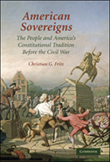Chris Fritz Explores Constitutionalism in New Book
November 8, 2007

Professor Chris Fritz explores how Americans struggled over the idea that the people would rule as the sovereign after the American Revolution in his new book, american sovereigns: the people and america's constitutional tradition before the civil war. (See reviews.)
In the 440-page book published by Cambridge University Press, Fritz challenges traditional American constitutional history, theory and jurisprudence, which trace the country's constitutionalism to the 1787 Constitutional Convention in Philadelphia. Rather, Fritz examines how debates both before and after the convention, about government action, law and the people's political powers revealed Americans struggling to understand how a collective sovereign — the people — could both play the role as the ruler and yet be ruled by governments of their own choosing.

"Today's constitutionalism was not inevitable,” he says, “but it was the end product of successive controversies at the state and national levels before the Civil War.” The constitutionalism of America during the decades following Independence differed from today’s constitutionalism. The crux of this difference lies in the novel question that American constitutionalism faced in the wake of independence: How could a collectivity — a people rather than a monarch — rule as the sovereign over a region larger and more diverse than Europe? Moreover, how could that sovereign speak clearly with one voice on matters of state as well as national concern?
“The constitutional authority of the people was a very powerful idea; after all, it served to topple a king and justify American governments," he says. "And like all powerful ideas it proved very difficult to control.” Leaders of the American Revolution were unable to claim a monopoly on who the collective sovereign was and how it could act.
“Once the genie of the people’s sovereignty was released from the bottle, it developed a life of its own and resisted being put back in the bottle,” he adds. His book traces the contest over the idea vitally important to Americans then, and which remains equally important today: What does it mean that in America “the people” rule?
Fritz holds a Dickason Professorship at the UNM School of Law, where he has taught since 1987. He joined the faculty to introduce legal history to first-year students, which remains a unique concept to legal education. He has a Ph.D. in history from the University of California, Berkeley and a J.D. from Hastings College of Law. He teaches a variety of legal and constitutional history courses, along with property law.
